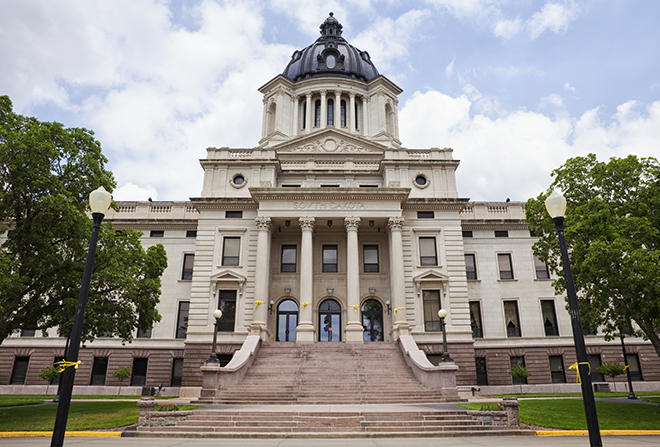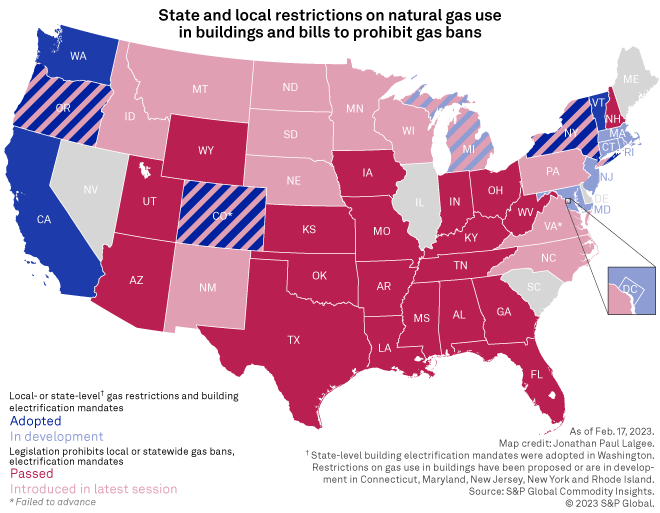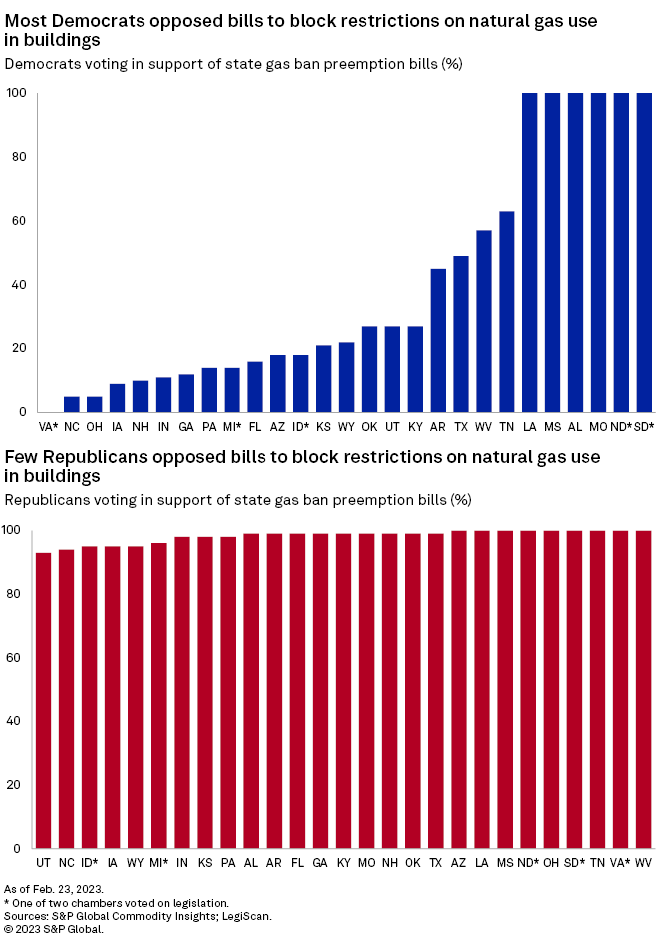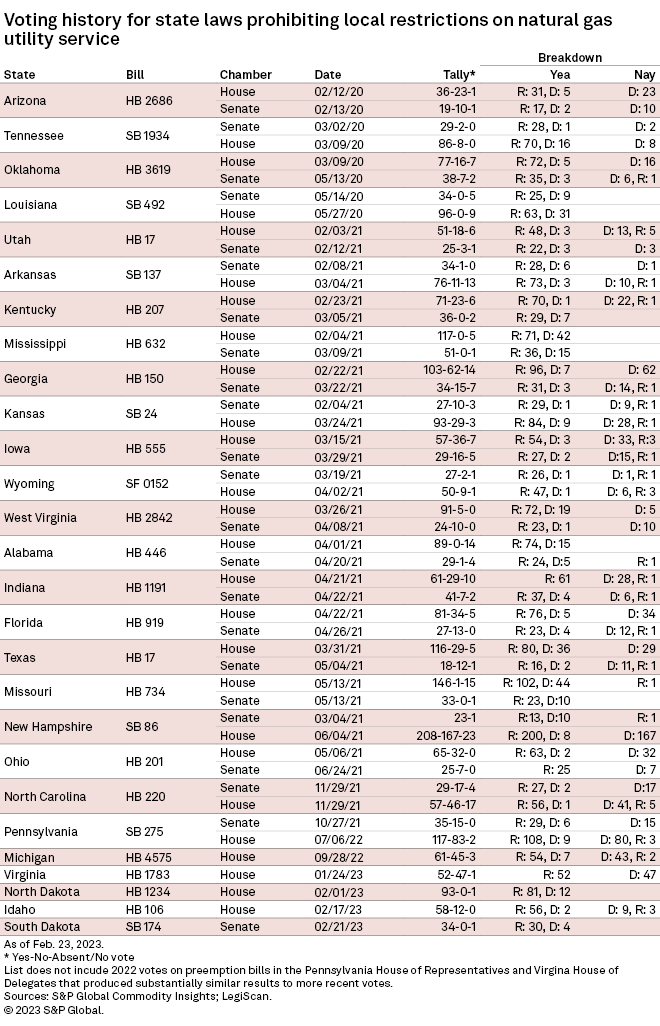S&P Global Offerings
Featured Topics
Featured Products
Events
S&P Global Offerings
Featured Topics
Featured Products
Events
S&P Global Offerings
Featured Topics
Featured Products
Events
Banking & Capital Markets
Economy & Finance
Energy Transition & Sustainability
Technology & Innovation
Podcasts & Newsletters
Banking & Capital Markets
Economy & Finance
Energy Transition & Sustainability
Technology & Innovation
Podcasts & Newsletters
S&P Global Offerings
Featured Topics
Featured Products
Events
28 Feb, 2023

| The South Dakota legislature is one of several Midwest statehouses advancing a bill to prohibit local restrictions on natural gas use in buildings. Source: powerofforever/E+ via Getty Images |
Gas utilities and state lawmakers have revived a campaign to prohibit local gas bans, led by statehouses in the U.S. West and Midwest.
In the current legislative session, lawmakers in at least 15 states have introduced bills that would preempt the authority of local governments to restrict natural gas use in buildings. That is the highest level of activity since 2021, when legislators introduced these preemption bills in at least 19 states.
In 2021, 16 of the bills passed, bringing the total to 20 gas ban preemption laws and creating a firewall across much of the U.S. Midwest and South. The following year, no preemption bills passed, in part because the mostly Republican-backed legislation ran into opposition in politically divided states or faced vetoes by Democratic governors.

In 2023, the legislation resurfaced in all eight states where the bills failed to advance in 2022. Lawmakers have also introduced the legislation in several Western and Midwestern states where S&P Global Commodity Insights had not previously identified preemption bills.
They have also turned up in a handful of liberal-leaning states where state or local lawmakers have already adopted fossil fuel restrictions or are pursuing them. At the same time, local gas bans have proliferated to dozens of cities, towns and counties, and a growing number of state legislatures are considering statewide building electrification mandates.
Bills gets second shot in 8 states
History has already repeated itself in two states where preemption bills stalled in 2022, and recent elections could have impacts in other states.
In Colorado, a preemption bill died in February in the Democrat-controlled House Committee on Energy and Environment for the third year in a row. The same month in Virginia, Democrats on a Senate committee once again sidelined the provision in a mostly party-line vote after the bill passed in the GOP-controlled House of Delegates.
The legislation also resurfaced in Michigan and Minnesota, where Democrats flipped statehouses in 2022, giving the party a trifecta in both states. The bills have not previously gained traction in either state. None of the Minnesota bills introduced since 2020 has received a full floor vote. In Michigan, just seven of 50 voting Democrats supported the bill in 2022's GOP-controlled session, and the bill died in committee in the Senate.

A preemption bill in Pennsylvania could also face long odds. A nearly identical 2022 bill failed to generate enough support in the House of Representatives to override former Gov. Tom Wolf's veto, largely due to lack of support among Democrats. The party recently took control of the House, and Democrat Josh Shapiro succeeded Wolf as governor.
In Wisconsin, the path for a reintroduced preemption bill looks better but still tentative. Republicans have a supermajority in the Senate but fell just short of a veto-proof majority in the State Assembly. The legislation has yet to receive a full floor vote, so it remains uncertain if there is enough support from both parties to override a potential veto from Democratic Gov. Tony Evers.
The legislation likely has a better second chance in Nebraska, where Black Hills Corp. is backing a preemption bill. Republicans control the governorship and hold nearly twice as many seats as Democrats in the state's unicameral legislature.
In North Carolina, a resurfaced preemption bill likely has an easier road to pass in 2023 because it does not contain a provision that split Republicans last year. The division deprived the 2022 bill of enough support to override Democratic Gov. Roy Cooper's veto. The GOP also slightly increased its majorities in both chambers in recent elections.
US West, Midwest lead new bills
Western U.S. multi-utility MDU Resources Group Inc. worked with legislators in several of the states where it operates — Idaho, Montana, North Dakota and South Dakota — to bring preemption bills forward for the first time in 2023.
"We believe it is important for consumers to have the choice of the kind of energy they use in their homes and businesses," Cory Fong, director of communications and public affairs at MDU Resources, told Commodity Insights. "While the conversation around energy continues to evolve, the need for grid reliability and energy affordability remains. A community's access to all available energy sources allows greater resilience in meeting the community's needs."
The bills in Idaho and the Dakotas are so far sailing through state chambers, bolstered by commanding majority control by Republicans, which has benefited bills in the past.
In their first chamber votes, North Dakota House Bill 1234 and South Dakota Senate Bill 174 joined a short list of preemption legislation that received unanimous bipartisan support. The first vote on Idaho House Bill 106 was more typical of the national trend: Most House Republicans supported it, while most Democrats opposed it.
New session, same stakeholders and debate
In Montana, where Republican control is not so commanding, Senate Bill 208 has not advanced as quickly. However, a Jan. 21 hearing in the Senate Committee on Energy and Communications demonstrated that a coalition of stakeholders that has supported preemption bills since 2020 is holding together.
The bill drew support from NorthWestern Corp., several labor unions, the Montana Chamber of Commerce and business associations representing builders, petroleum companies, realtors and restaurants. It drew opposition from environmentalists, the Montana Renewable Energy Association and the Montana Association of Counties — though an association of oil, gas and coal-producing counties voiced support.
The hearing also revived a common debate. Opponents said the bill would strip cities and counties of local authority to set climate policy and create a chilling effect. Proponents said the legislation protected Montanans from city- or countywide mandates, thereby preserving consumer choice.

A preemption bill also surfaced for the first time in New Mexico, where Democrats retained a trifecta of power in recent elections. The House Committee on Energy, Environment and Natural Resources voted to advance the bill, with two Democrats joining all of the committee's four Republicans to out-vote five Democrats.
The proponent of New Mexico House Bill 431, the Consumer Energy Alliance, based the legislation on Florida House Bill 919, which passed in 2021, and additionally blocked restrictions on fuel sources for power generation.
Challenging gas bans in blue states
Lawmakers introduced the legislation in other Democrat-controlled states, where state and local lawmakers have passed or are progressing fossil fuel restrictions in buildings.
Republicans in the New York Senate and Assembly introduced legislation to prohibit local gas bans. Meanwhile, Democrats in both chambers put forward bills that require state building code authorities to ban fossil fuel combustion equipment in new buildings, a policy recommendation that Democratic Gov. Kathy Hochul supports.
Oregon Republicans also introduced a preemption bill shortly before Eugene, Ore., adopted the state's first local gas ban. Democrats put forward a bill that would expressly authorize local governments to restrict fossil fuel use in buildings. The chief sponsor is Rep. Mark Gamba, who spearheaded a gas ban effort in Milwaukie, Ore., while serving as mayor.
In Washington, several pieces of legislation targeted the state's status as first in the nation to approve building code updates that require statewide electric space and water heating in new residential and commercial construction. One bill says the Washington State Building Code Council cannot prohibit gas use in buildings. Another affirms that the legislature has not given the council authority to consider greenhouse gas emissions in code development. A third bill would add a council seat reserved for a utility representative and make the council's managing director subject to Senate confirmation.
In New Jersey, where Gov. Phil Murphy recently pledged to electrify buildings, Republicans introduced a bill to block the state from banning gas cooktops, which has recently become a wedge issue. Democratic and Republican lawmakers have previously tried to block statewide all-electric space and water heating mandates or place requirements on the executive branch before it requires electrification.
Meanwhile, several Democrats and one Republican in the Connecticut Senate put forward a bill that prohibits fossil fuel and electric resistance space heating, which would essentially require electric heat pumps and other alternative systems. In Rhode Island, House Democrats introduced a bill requiring local governments to deny a building permit to any commercial or residential building that is not all-electric, starting in 2025 and subject to exemptions.
S&P Global Commodity Insights produces content for distribution on S&P Capital IQ Pro.
